Special Issue
South Asia
The Beat of 1.8 Billion People
Human Resources Development: Engineering & Technology × Industry-Academia Partnerships
Results from Tag-team India-Japan Collaboration
In India, engineering and technology are developing rapidly. More than anything, its skilled human resources are the drivers of this growth. Japan has been working with the Indian Institute of Technology Hyderabad (IITH), ranked as India's premiere engineering university, to deepen industry-academia links across national borders.
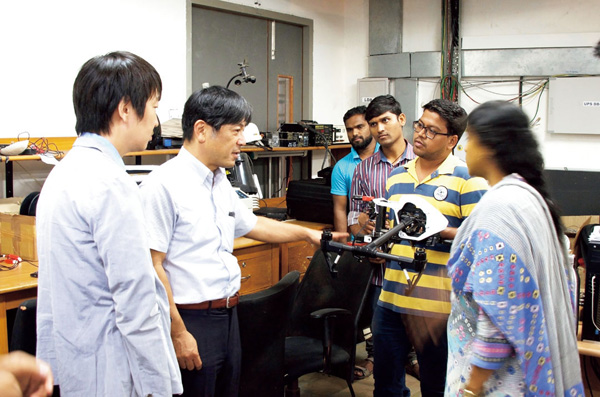
"Let's research this together."
IITH students and researchers from Japan's National Institute of Advanced Industrial Science and Technology. Inter-personnel exchanges and joint research have been conducted in the field of artificial intelligence since 2018.
Japan-India University Collaboration Carries Out Diverse Joint Research
The Indian Institute of Technology, a national university group, graduates some of the world's most skilled people in the fields of engineering and technology. Its Hyderabad School (IITH), established in 2008, aims to strengthen the relationship between India and Japan through human and academic exchanges. With the aim of encouraging Japanese companies to enter the Indian market, recruiting Indian human resources, and sharing technologies through joint research with Japanese universities, JICA has been cooperating with the school, both in terms of "hard" aspects, such as equipment, and "soft" aspects, such as capacity building in areas where India's needs and Japan's strengths coincide.
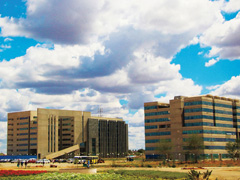
IITH is a relatively new university that was established in 2008. Even today, the campus is being developed with support from Japan.
This broad range of cooperation in the soft aspects include the "Project for Future Researchers at Indian Institute of Technology Hyderabad to Enhance Network Development with Scholarship of Japan (FRIENDSHIP)." This project, which is made up of three separate programs, helps to establish India-Japan industry-academia research networks through technology transfer. The first program gives IITH students access to a JICA scholarship allowing them to study in a master's or doctoral course at a Japanese university. To date, 136 students have taken part, with 52 already being awarded their degrees, and 36 of those have found work in Japan.
The second promotes joint research between faculty members at IITH and in Japan through a program to support the construction of inter-university networks. For example, joint research into biogas from waste products and health-related research and development that links smartphones and hospital medical charts are currently underway.
"The differences in how Indians think and how Japanese think can create unexpected solutions, so there's merit for both sides in this joint research," said HIURA Chikako, a JICA Expert who promotes the project as the university administrative coordinator for IITH. She noted that there is an increasing amount of interpersonal exchange, with Japanese students studying at IITH as interns.
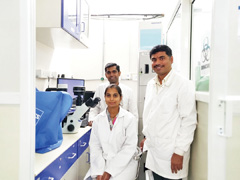
Students majoring in biomedical engineering. The machinery and equipment in their lab have also made use of support from Japan.
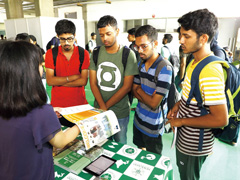
"I want to do postgraduate study in Japan!"
The annual overseas study briefing on Japan. About 30 IITH students are given scholarships to study in master's or doctoral courses.
Message from the Director
Prof. B. S. Murty
Director of Indian Institute of Technology Hyderabad
IITH has been getting a lot of support through our cooperative relationship with Japan over the years. To date, around 130 graduates are now working in Japan, and I think this is the largest number for any Indian university. Together we have a bright future thanks to our very dynamic joint research. At present, we have cooperative relationships with more than fifty universities, research institutes, and companies in Japan. This has resulted in a large number of publications in refereed journals co-authored by Japanese scientists and IITH faculty, as well as many joint patent applications. None of this would have been possible without JICA's help.
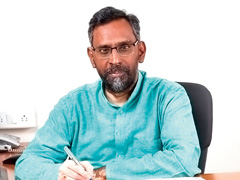
Prof. B. S. Murty
As a way to enhance this cooperative relationship even further, we are studying measures that will allow IITH faculty members and Japanese university faculty members to serve as joint supervising professors for doctoral students. I am confident that in the next five-to-ten years, the links between IITH and Japan will lead to impressive results that will draw the world's attention.
Utilize skills learned in Japan with work matching
The third program supports the establishment of industry-academia networks. It provides support for joint research between IITH and Japanese companies, and facilitating hiring and internships. There are increasing numbers of Indian students being hired by Japanese companies, and since 2018, the Japan External Trade Organization (JETRO) and IITH have jointly held JAPAN DAY, a job-seeking event which promotes this hiring. This pleases HIURA, who has worked to bring together JETRO and IITH's employment section; she says, "Japanese companies with an interest in Indian human resources are taking part, and actively hiring people."
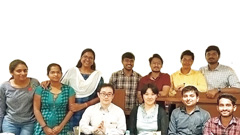
"This relationship enriches us both."
The FRIENDSHIP project involves 12 universities in Japan, and around 200 researchers so far have traveled between both countries to share their research results.
Mahendra Kumar, a project participant who studied seismic engineering at the University of Tokyo, is now a special researcher at Japan's National Research Institute for Earth Science and Disaster Resilience (NIED). He comments, "Being able to study in Japan and get the job I wanted was all thanks to the FRIENDSHIP project. I am very grateful." Since his hiring, IITH and NIED have exchanged a memorandum of understanding, and are considering a framework for joint research, researcher exchange, and hosting interns. HIURA has high expectations, "While promoting industry-academia partnerships, I also want to work on links with other JICA projects. By drawing on the network of IITH graduates in Japan, I hope we can broaden the opportunities for Indians to find roles in Japanese companies."
In addition to human resource development, the "Research Park," where private companies and IITH can conduct joint research, and the "Business Incubation Center," where the results of such research can be used to support entrepreneurship. The facillities are being constructed with the cooperation of JICA, and are scheduled for completion this fiscal year. Given such developments, exchange between India and Japan will continue to deepen in the future.
Graduates working in Japan!
PAL Mahendra Kumar
Special Researcher, National Research Institute for Earth Science and Disaster Resilience
After graduating from IITH, I gained my doctorate in engineering at the University of Tokyo. Without the Academic Fair, and the briefing on studying in Japan held by JICA for students at IITH, I might not have ever come to Japan. Japan's support not only shaped my future, but it has also given great opportunities to numerous IITH students to learn and make careers in Japan. Moreover, having talented IITH students studying in Japanese universities leads to ever-more dynamic research at these universities, in a virtuous cycle.
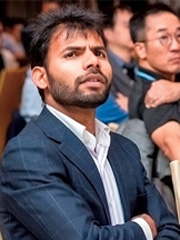
PAL Mahendra Kumar




scroll